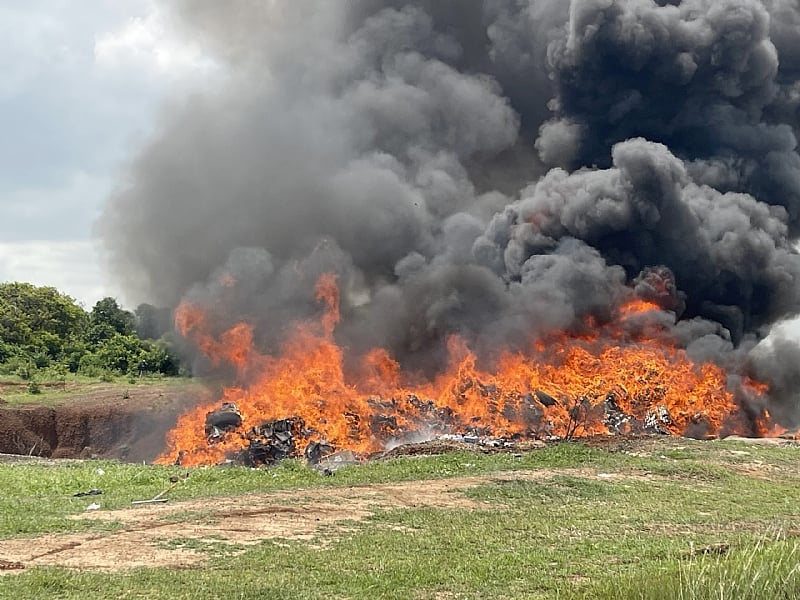The Narcotics Control Commission (NACOC) of Ghana, in collaboration with the National Investigation Bureau (NIB), conducted a significant drug destruction exercise at the Bundase Military Camp. Over 16,000 kilograms of illicit substances, with an estimated street value exceeding US$350 million, were incinerated. This substantial haul included a variety of narcotics: cocaine, heroin, cannabis, methamphetamine, MDMA (ecstasy), ketamine, cathinone, codeine, diclofenac, and hyergra. The operation underscores the Ghanaian government’s commitment to combating the pervasive issue of drug trafficking and its detrimental impact on society, particularly the youth. The public destruction served as a testament to NACOC’s transparency and adherence to the rule of law, with the presence of officials from various agencies, including the Environmental Protection Agency (EPA) and the Ghana Standards Authority (GSA). The GSA conducted on-site verification of the drugs prior to destruction, confirming the findings of earlier analyses carried out at their facilities.
The timing of the operation coincided with the commemoration of World Drug Day, amplifying the message of NACOC’s unwavering resolve to tackle drug-related crimes. Brigadier-General Maxwell Obuba Mantey, Director-General of NACOC, emphasized the importance of destroying the seized narcotics in a safe and controlled environment, adhering to strict environmental protection protocols. He highlighted the significance of the public witnessing this exercise as a demonstration of their commitment to transparency and accountability in the fight against illicit drug trade. The sheer volume of drugs destroyed serves as a stark reminder of the scale of the challenge and the efforts required to combat it. The event served not only as a display of NACOC’s achievements but also as a warning to those engaged in drug trafficking.
Brigadier-General Mantey issued a stern warning to individuals involved in the illicit drug trade, urging them to cease their activities. He underscored the detrimental effects of these substances on the youth and the nation’s future, emphasizing NACOC’s determination to disrupt and dismantle drug trafficking networks. He announced the commencement of targeted special operations in the coming month, aimed at identifying, pursuing, and prosecuting those involved in this illegal trade. This proactive approach signals a significant escalation in NACOC’s enforcement efforts. The Director-General also called for the cooperation of the media in exposing perpetrators and holding them accountable.
The collaborative efforts extend beyond the NIB to include the Pharmacy Council. Mr. Alexander Twum-Barima, Deputy Director-General in charge of Enforcement, Control and Elimination at NACOC, highlighted the newly established partnership with the Pharmacy Council. This collaboration aims to prevent the diversion of pharmaceutical drugs into the illicit market. The Pharmacy Council has committed to revoking the licenses of any pharmacies found to be complicit in the illegal trade of controlled substances, further strengthening the regulatory framework. This partnership signifies a comprehensive approach to tackling drug trafficking, encompassing various facets of the supply chain.
Mr. Twum-Barima echoed the Director-General’s warning to those involved in drug trafficking, emphasizing the extensive intelligence gathering undertaken by NACOC across multiple regions. This intelligence will inform their targeted operations, making it difficult for traffickers to anticipate enforcement actions. He outlined the planned operations for the following month, which will target various locations, including shops and warehouses suspected of involvement in the illicit drug trade. This comprehensive approach aims to disrupt the entire supply chain, from importation and distribution to retail sales.
In conclusion, the destruction of over 16,000 kilograms of illicit drugs, valued at over US$350 million, represents a significant victory for NACOC and its partners in the fight against drug trafficking in Ghana. The public nature of the destruction underscores the commitment to transparency and accountability, while the announced targeted operations signal a proactive and intensified effort to disrupt the drug trade. The collaboration with the Pharmacy Council further strengthens the regulatory framework, aiming to prevent the diversion of pharmaceutical drugs into the illicit market. This comprehensive approach, combined with the strong message sent to traffickers, underscores Ghana’s commitment to protecting its youth and securing its future against the devastating impact of drug abuse.














